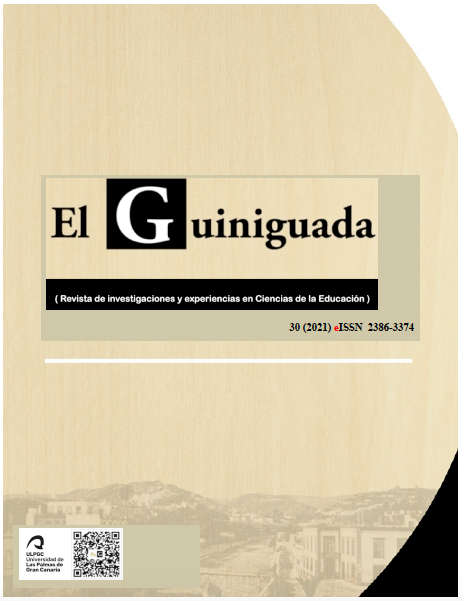Contributions from research on communicative acts to the overcoming of gender violence
doi.org/10.20420/ElGuiniguada.2021.404
Keywords:
gender violence, dialogic communicative acts, communicative acts of power, consentAbstract
Language plays a fundamental role in the construction of social reality. Theories and research on speech acts and social interaction have made great contributions to the analysis of how we do things with words and the impact thus generated in the construction of relationships. Nevertheless, new social conquers such as the necessary improvements in the analysis of consent set out by movements such as “me too” demand research that approaches the combination of elements present in the communicative acts, not only in spoken language. Gestures, tone or social contexts might contribute to making the same words or the same silences be part of harassment or of relationships free from it. In this article we present a recent contribution in research on consent: the difference between communicative acts of power, which favor sexual harassment and gender violence, and dialogic communicative acts, which promote relationships free of violence.
Downloads
References
Aguilar, C. (2012). La didáctica de la lengua y la literatura y la teoría critica: presentación. Lenguaje y Textos, 36, 5-14. http://hdl.handle.net/10234/71046
Austin, J. (1962). How to Do Things with Words. Oxford University Press.
Flecha, R. (2021). Second-Order Sexual Harassment: Violence Against the Silence Breakers Who Support the Victims. Violence Against Women. doi: 10.1177/1077801220975495
Flecha, R., Tomás, G., & Vidu, A. (2020). Contributions From Psychology to
Effectively Use, and Achieving Sexual Consent. Frontiers in Psychology, 11, 92. doi: 10.3389/fpsyg.2020.00092
Habermas, J. (1984). The Theory of Communicative Action. V1. Reason and the
Rationalization of Society. Beacon Press.
Portell, D., & Pulido, C. (2012). Communicative acts which promote new masculinities. Overcoming hegemonic masculinity in the workplace and the school. MSC. Masculinities and Social Change, 1(1), 61–80. doi: 10.4471/mcs.2012.04
Puigvert, L., Vidu, A., Melgar, P., & Salceda, M. (2021). BraveNet Upstander Social Network against Second Order of Sexual Harassment. Sustainability, 13, 4135. doi: 10.3390/su13084135
Rodríguez-Navarro, H., Ríos, O., Racionero, S., & Macías, F. (2014). New methodological Insights into Communicative Acts that Promote New Alternative Masculinities. Qualitative Inquiry, 20(7), 870–875. doi: 10.1177/1077800414537209
Searle, J. (1969). Speech acts: An essay in the Philosophy of Language. University Press.
Searle, J. & Soler, M. (2005). Lenguaje y ciencias sociales. Diálogo entre John Searle
y CREA. El Roure.
Segovia Aguilar, B. (2017). La universidad y su participación en las comunidades de
aprendizaje. Un compromiso para la transformación social y educativa. El
Guiniguada. Revista de investigaciones y experiencias en Ciencias de la
Educación, 26, 34-46. doi: 10.20420/ElGuiniguada.2013.333
Soler, M. (2006-2008). Actos comunicativos y superación de las desigualdades sociales
en las relaciones de género. Plan Nacional I+D+I, Universidad de Barcelona. https://masculinidadescrea.wordpress.com/
Soler-Gallart, M. (2017). Achieving Social Impact: Sociology in the Public Sphere.
Springer.
Soler, M., & Flecha, R. (2010). Desde los actos de habla de Austin a los actos
comunicativos. Perspectivas desde Searle, Habermas y CREA. Revista Signos, 43(2), 363-375. doi: 10.4067/S0718-09342010000400007
Weber, M. (2002). Economía y sociedad. Esbozo de sociología comprensiva.
Fondo de Cultura Económica.
Published
How to Cite
Issue
Section
License
Authors who publish with this journal agree to the following terms:
- Authors retain copyright and grant the journal right of first publication with the work simultaneously licensed under a Creative Commons Attribution License that allows others to share the work with an acknowledgement of the work's authorship and initial publication in this journal. You can not make a commercial use of the work. The use derived from the work is also not allowed.
- Authors are able to enter into separate, additional contractual arrangements for the non-exclusive distribution of the journal's published version of the work (e.g., post it to an institutional repository or publish it in a book), with an acknowledgement of its initial publication in this journal.
- Authors are permitted and encouraged to post their work online (e.g., in institutional repositories or on their website) prior to and during the submission process, as it can lead to productive exchanges, as well as earlier and greater citation of published work (See The Effect of Open Access).

















